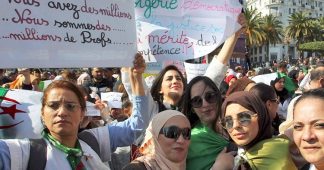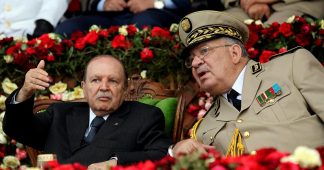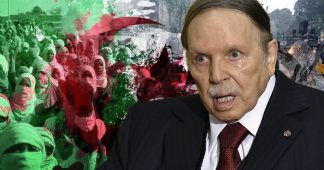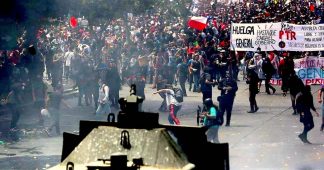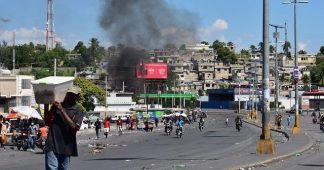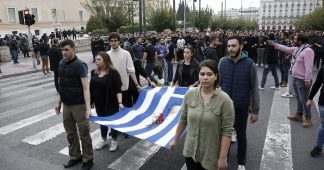After more than one year of weekly protests, the Algerian uprising continues unabated. It has booked historical victories, but there is a long road ahead still.
By Hamza Hamouchene
March 12, 2020
Algeria is going through a revolutionary phase. The mass-scale uprising that started in February 2019 has been sustained for more than a year now and is showing an incredible resilience and soumoud (steadfastness in Arabic). Hundreds of thousands are still in the streets, joining huge weekly protests every Tuesday and Friday (and recently some Saturdays and Sundays), demanding radical democratic change and the demilitarization of the republic.
On February 22, 2020, the first anniversary of the popular movement’s emergence onto the political scene, millions of people renewed their belief in the revolution and expressed their determination to continue the struggle by organizing massive marches in various parts of the country. In reaction to the current President Tebboune’s announcement of marking the date as a national day of “cohesion between people and the army,” protesters chanted “We didn’t come to celebrate; we’ve come to kick you out!”
The people reasserted their demand for a civilian state in a powerful slogan that has become symbolic of the uprising’s core aim, especially since the electoral masquerade of December 2019: “Tebboune is a bogus president. He was imposed by the army and has no legitimacy…The people were liberated and it’s them who decide…A civilian state now!”
Achievements and victories
Throughout the year, the popular movement (Al Hirak Ach’abi) accomplished a lot. The Hirak forced the Military High Command (MHC) to distance itself from the presidential clan and effectively deposed Bouteflika, president for the last 20 years. It also aborted two presidential elections: the first one in April, in which Bouteflika was running for a fifth term and the second one on July 4, which was seen as a front to maintain the primacy of the MHC. Whatever we think about the regime’s highly mediatized anti-corruption campaign — which is largely smokes and mirrors and settling of accounts between various factions — the fact that high profile oligarchs and once-powerful individuals, including former prime ministers, chiefs of security services and the deposed president’s brother, are in jail, is a big achievement in itself. This would not have happened without the popular mobilizations and calls for accountability and an end to corruption: “You devoured the country…Oh you thieves!”, “You will be all punished”…
Despite all the odds stacked against it and the state’s efforts to divide, co-opt and exhaust the movement, it maintained an exemplary unity and peacefulness. This was demonstrated in various slogans such as: “Algerians are brothers and sisters, the people are united, you traitors.” Perhaps one of the greatest achievements of the popular uprising is the change in political consciousness and the determination to fight for radical democratic change. People discovered their political will and realized they are in control of their own destiny. This liberatory process unleashed an unequaled amount of energy, confidence, creativity and subversion.
After decades of curtailing civil society, silencing dissent and atomizing the opposition, the fact that the movement is still going strong after more than one year on the streets, not retreating or subsiding but pushing forward, is truly remarkable and inspiring. The Hirak succeeded in unraveling the webs of deceit that were deployed by the MHC and its propaganda machine. Moreover, the evolution of its slogans, chants and forms of resistance is demonstrative of processes of politicization and popular education. The re-appropriation of public spaces created a kind of an agora where people discuss, debate, exchange views, talk strategy and perspectives, criticize each other or simply express themselves in many ways including through art and music. This opened up new horizons for resisting and building together. Those who pronounced the Hirak dead, got their rebuttal. The popular movement is here to stay and signaled its resolve to force the system to yield: “The people want independence!”, “It’s either us or you, we swear we are not stopping!”
Cultural production took on another meaning because it was associated with liberation and seen as a form of political action and solidarity. Far from the folkloric and sterile productions under the suffocating patronage of some authoritarian elites, we are seeing instead a culture that speaks to the people and advances their resistance and struggles through poetry, music, theater, cartoons and street-art.
Women also played — and still play — a crucial role in the uprising, as can be seen in their strong presence in marches and protests all over the country, including very conservative areas. They are actively involved in the students’ movement that managed to maintain its Tuesday marches for more than a year now. Some of them faced repression and even jail but they continue to show their unflinching dedication to the struggle. Some feminist organizations are doing their best to put women’s liberation at the center of this democratic revolution and the presence of revolutionary figures such as Djamila Bouhired and Louisette Ighilahriz denotes that the struggles for popular sovereignty and women’s liberation are interlinked and ongoing. On International Women’s Day (8th March), Algerian women chanted in the streets: “We are not here to celebrate, we are here to uproot you!”
This is not just a middle-class uprising. The popular classes from marginalized neighborhoods, the unemployed youth, the working poor are all involved, marching for freedom and equally voicing their indignation at their socio-economic exclusion and anger at the processes of pauperization they are subjected to. “Antouma Asbabna!” they shout, roughly meaning “You are responsible for our misery!” Many of the famous and poignant slogans and chants were the invention and creation of this “youth without horizons” that suddenly saw a light at the end of the tunnel. La Casa d’El Mouradia (in reference to the popular TV series La Casa de Papel) is one hymn of the revolution that originated from football fans and went beyond stadiums to embrace and embolden the Hirak.
It is a revolution!
Algeria has not witnessed such momentous events since independence from French colonial rule in 1962, and that is what makes this a revolutionary moment and a conjuncture full of potential for radicalization and escalation of the struggle.
The ongoing Algerian revolution might not fit the dominant imaginary about revolutions, that of mass-scale insurrections led by a vanguard revolutionary party toppling regimes and taking power, affecting a kind of a rupture with the past inevitably leading to the instauration of the new political and economic order with different ruling classes. These tend to be violent processes shaped by bloody confrontations with the state’s repressive apparatuses, sometimes through armed struggle.
In Lenin’s words, “For a revolution to take place, it is usually insufficient for the lower classes not to want to live in the old way; it is also necessary that the upper classes should be unable to live in the old way.” When we apply this to Algeria, we can see that this is in fact what is happening: people are no longer accepting the status quo and the current ruling class is struggling to contain the movement, despite all the means at their disposal towards that purpose: repression, physical violence, arrests, imprisonment, restriction of freedom of movement, suppression of media freedoms, divide and rule tactics through hate propaganda, deceptive ploys to give the impression that change is happening, etc.
It is true that there is currently no revolutionary vanguard party representing the interest of the working poor and the popular masses capable of leading the revolution. It is also true that the workers are not actively participating in the revolution as workers due to the weakness and fragmentation of the independent trade union movement. And it is true that the uprising has not overhauled the system yet or managed to create a radical break with the ancien regime as the oligarchic-military elites are still in power, albeit with some reshuffling in the configuration of the ruling classes. However, the revolutionary character of the popular movement is there for all to see.
Over the past year, this movement has overcome so many obstacles and avoided dangerous polarizations and showed undeniable genius in seeing through the manoeuvres of the regime; always responding with very creative, flamboyant, clever and radical slogans and tactics. For example, the youth made it really difficult for the presidential candidates to carry out their campaigns in various places of the country by blocking access to their towns as well as disrupting meetings. People actively boycotted the elections of December 12 by closing down some electoral bureaus in the Kabylie region and organizing protests on the day of the elections. When results were announced the next day, people took to the streets once again to denounce the electoral charade.
Following the announcement that the multinationals-friendly hydrocarbon draft law would be discussed in parliament in November 2019, the people spontaneously went to the streets for a first time on a Sunday (the start of the working week in Algeria) to protest in front of the parliament denouncing the compardore elites’ attempts to further undermine their country’s sovereignty. And a similar reaction took place when president Tebboune announced in January that Algeria will be exploiting its shale gas potential. The people responded: “You frack in Paris, not here!” in reference to French multinationals like Total interested in exploiting shale resources in Algeria.
Algerians know what the military are capable of and despite the trauma of the black decade (the odious war against civilians of the 90s), they are bravely still insisting: “A civilian state not a military one!” By doing so, the Algerian system is exposed for what it is: a military dictatorship hiding behind a “democratic” façade.
Anti-colonial and sovereign at heart
So beyond the largely semantic arguments around whether it is a movement, uprising, revolt or a revolution, one can say for sure that what is taking place these days in Algeria is a transformative process pregnant with emancipatory potential. The evolution of the movement and its demands specifically around “independence,” “sovereignty” and “an end of the pillage of the country’s resources” are fertile ground for anti-colonial, anti-capitalist, anti-imperialist and even ecological ideas and can open the way for a progressive struggle by mobilizing the relevant social forces: workers (formal and informal), peasants, unemployed youth, popular masses, etc.
What reinforces this assertion is the fact that this Algerian revolution, like its precedent in the 1950s, is deeply anti-colonial. This is a unique feature that differentiates it to a certain extent from the other uprisings in North Africa and West Asia, and in my view warrants more attention and analysis. Given their experiences suffering under one of the most cruel genocidal and racist settler colonialisms, many argue that Algerians have bred a deep sense of social justice, still present and noticeable till today. Algerians are making a direct link between their current struggle and the anti-French colonial struggle of the 1950s and see their efforts as the continuation of decolonization. When chanting “Generals to the dustbin and Algeria will be independent”, they are laying bare the vacuous official narrative (around the glorious revolution) and reveal that it has been shamelessly used by anti-national bourgeoisies to scandalously pursue personal enrichment.
Algerians are thus recovering the revolutionary credentials and reaffirming their desire of being the true heirs of the martyrs who sacrificed their lives for the liberation of this country. We have seen so many slogans and chants that captured this desire and made references to anti-colonial war veterans such as Ali La Pointe, Amirouche, Ben Mhidi and Abane: “Oh Ali [la pointe] your descendents will never stop until they wrench their freedom!” and “We are the descendents of Amirouche and we will never go back!”
These anti-colonial sentiments and the reaffirmation that formal independence has no meaning without popular and national sovereignty are reasserted by a staunch hostility to any foreign interference and imperialist intervention. And that goes from Western powers to Russia, China, UAE, Saudi Arabia, etc. Suffice to say that the Algerian Hirak is an anti-systemic movement with anti-colonial politics.
Challenges facing the Hirak
Like with any revolution, counter-revolutionary forces mobilize to derail, crush or contain it. And this is done at so many levels: political and economic, material and discursive, local and regional. For a detailed account of how counter-revolution manifested itself in Algeria, please see Brahim Rouabah’s essay on this matter. However, it is worth making a few points here.
Times of revolutions and uprisings can also be times of entrenching unpopular economic policies and extending more concessions to foreign investors. The cases of the budget law of 2020 and the new Hydrocarbon Law are edifying. The budget law is set to reopen the door for international borrowing, and impose harsh austerity measures by lifting various subsidies and cutting public spending. In the name of encouraging foreign direct investments (FDIs), it plans to exempt multinationals from tariffs and taxes and increase their share in the national economy by removing the 51/49 percent investment rule that limits the part of foreign investment in any project to 49 percent, undermining national sovereignty even more.
Concerning the new Hydrocarbon Law that came into effect in January 2020, the former Minister of Energy did not shy away from declaring last October that the proposed law was devised after “direct negotiations with the five oil majors.” The law is multinational-friendly and will allow oil corporations to secure long-term concessions, expatriate proceeds, absolve them from tax responsibilities and transfers of technology. Another positive signal to multinationals is the appointment of a new energy minister who has been instrumental in drawing up the new law, which on top of the incentives and concessions mentioned above opens the way to destructive projects such as exploitation of shale gas in the Sahara and offshore resources in the Mediterranean.
We cannot therefore fully appreciate the political situation in Algeria without scrutinizing foreign influences and interferences and apprehending the economic question from the angle of natural resource grabs, energy (neo)colonialism and extractivism. This includes the enormous concessions made to multinationals and the pressures coming from outside to execute further liberalization in order to remove all restrictions to international capital and fully integrate Algeria into the global economy in a totally subordinate position. It is within this context that we should see the recent trip of IMF staff to Algeria.
The counter-revolutionary campaign currently underway in Algeria is not driven solely at the local level but also by a constellation of regional and international state and corporate actors: regionally, the UAE, Saudi Arabia, and Egypt are leading the counter-revolution and using their money and influence to halt and crush potentially contagious waves of revolt in the region. It is known that the Algerian MHC (Military High Command) entertains very good relations with the Emiratis. The late head of the MHC, General Gaid Salah was harshly criticized by the popular movement of receiving orders from the UAE: “Gaid Salah is the lackey of UAE”. His successor, General Chengriha paid a visit to the country at the end of February and was shown around several arm fairs.
It is also revealing that President Tebboune chose Saudi Arabia as the destination of his first state-visit after his election. When it comes to Egypt, the collusion between the two brothers in crime has been obvious. In fact, el Sisi’s first state visit following the coup was to Algeria in June 2014, with the aim of discussing coordination on security and energy. Alongside the Saudis and Emiratis, Egyptians returned the favor through troll farms and disinformation campaigns in order to discredit the Algerian Hirak. At the global level, Western powers such as France, the US, the UK and Canada, along with their major corporations, are all complicit and supportive of the Algerian regime and do not want any threat to their economic and geostrategic interests.
Add to this the unfolding situation in neighboring Libya where a proxy war is taking place involving many actors: France, Italy, Saudi Arabia, UAE, Egypt, Turkey, Russia, Sudan, Jordan… What is happening there is deeply worrying for the revolutionary process in Algeria and beyond: an escalation of the war will not only destabilize the whole region but also will likely put a brake on the popular movement in Algeria.
Another challenge facing the Hirak is the prospect of further divisions that need to be absolutely avoided. The Hirak succeeded in overcoming divisions fostered by the regime for decades. We saw how people were chanting: “Arabs, Kabyles, all brothers and sisters!” in response to attempts to fan the flames of discord by pushing for a hate campaign against the Kabyles and banning the brandishing of the Amazigh cultural flag. The Algerian Hirak must show once again the same rejection of the old polarization “Islamists vs. Secularists” that tend to be enforced by les eradicateurs, those “secularists” (laïcards in French) and “democrats” who sided with the murderous military regime in its eradication campaign of all “Islamists” and their sympathizers in the 90s following the military coup.
First, not all Islamists are the same, and not all of them are preaching violence. Some of them learnt from past mistakes and evolved towards accepting democratic principles like the case of Al Nahda in Tunisia. And some of them have never been compromised by dealings with the regime in place. It seems that people who refuse to budge are those “democrat” eradicators who tend to be those francophone colonized elites that internalized an anti-religious (currently Islamophobic) conception of secularism (laïcité in French) and who should recognize that they committed a major political error siding with the military at the time. The current context of acceptance of the Other, where people resist and fight together — whatever their social background and ideology — is a space where these kinds of divisive polarizations should be overcome. This has been demonstrated yet again by a new pertinent slogan: “It’s not Islamists, It’s not Secularists…..It’s the gang that is robbing us openly”.
In the absence of a hegemonic political force that is capable of leading the movement and transforming its demands into a coherent political and economic project, it becomes essential for all the opposition forces, either Islamists or secularists, right or left to create a tactical broad front to significantly shift the balance of forces on the ground towards the popular movement and force the military regime to negotiate and concede. This is one lesson that the Algerian uprising can learn from its counterpart in Sudan. The vacuum created by decades of political suppression, fragmentation and cooptation of political actors allows the regime to continue taking initiatives and even creating certain realities on the ground. This needs to be surpassed by rallying around a unified oppositional bloc that will advance an alternative transitional road map.
The condition of joining such a front/alliance should be the belief in a true democratic transition that will open the possibilities for radical change. It goes without saying that progressive and patriotic forces need to maintain their independence and continue the struggle at the socio-economic level against liberals either in their secular or Islamist variants and against all conservative forces that carry a reactionary social programme. The political elites need to rise up to the challenge and assume their historic responsibility.
Preparing for the long struggle ahead
The Algerian uprising embarked on its second year and despite the immense difficulties and challenges, the movement continues its huge weekly mobilizations. This first anniversary must be taken not just as a moment of celebration but also as a moment of collective reflection and learning about its achievements as well as its shortcomings and mistakes. We are in a situation of relative equilibrium in the balance of forces on the ground. The Hirak could not topple the regime and the latter could not exhaust the movement. The Algerians mobilized in the Hirak are not giving up and refuse endorsing the dictatorship’s democratic façade.
The system will not yield easily. For this reason, the balance of forces must be shifted significantly towards the masses by maintaining the resistance (marches, protests, occupations of public spaces, general strikes, other acts of civil disobedience, etc) to force the regime to give way to people’s demands. The Hirak must realize other gains and victories in order to consolidate and this needs to be done through:
- Structuring the movement at the grassroots level by pushing and encouraging local self-organization at the workplace, through neighborhood committees, student and women collectives, independent local representations and the opening up of more spaces for discussion, debate and reflection in order to have a solid platform or a coherent program. This will inscribe the dynamic in the medium and long term and might enforce a situation of dual power.
- Insisting on individual and collective freedoms of expression and organizing all the time and campaign tirelessly for the release of all political prisoners.
- And finally wedding social justice and socio-economic rights to democratic demands. Because if Algeria continues on this path of liberalization and privatization, we will definitely see more social explosions and discontent as a social consensus cannot be achieved while the resulting pauperization, unemployment, and inequality continue. The recent slump in oil prices may just hammer the final nail in the coffin of a rentier system that is highly dependent on oil and gas exports for its survival.
In this context, Algerians must not dig their own graves by halting their revolution halfway. The struggle for democratization will be long and must go on. Let’s just hope that 2020 would bring more victories to the Algerian people’s movement.
* Hamza Hamouchene is an Algerian researcher, activist and commentator. He is the North Africa Program Coordinator at the Transnational Institute (TNI).
Published at https://roarmag.org/essays/the-algerian-revolution-the-struggle-for-decolonization-continues/
